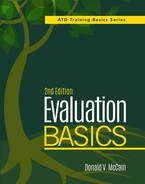Preface
Organizations invest millions of dollars in training programs, some purchased and some internally developed, some delivered face-to-face, and some online or through the virtual classroom. Although we hope that they are effective, our internal clients demand that they are effective. The question is: What does effective mean? Is it providing cost-effective training? Is it that the participants had a good time? Much of what we do involves an element of entertainment. Take this scenario for example: A potential client was explaining a change management training program he was providing for hourly workers. The participants loved it because the facilitator made them laugh. They had a good time. Is this a measure of effectiveness? Course participants may say yes, but your client may very well say no. Effectiveness for clients means learning, application, and impact—not just the learners’ reactions.
Another story may make the point. A company’s learning director wanted an account management course for her sales professionals. During a design meeting, the client came in and almost shouted, “I want to know how we know if the salespeople are learning anything and if they are using it!” Fortunately these aspects of evaluation were built into the course, because the learning director had just come from a meeting with the vice president of sales, who indicated that he was withdrawing all support until the training function could demonstrate that the training was making a difference. He wanted to know if the salespeople were learning anything. And, if they were learning, were they using the content?
These examples illustrate that training effectiveness includes learning, use on the job, and impact. Indeed, an evaluation plan should provide for each of these elements and implement them to the extent that the client wants to see results. This means that the client determines the extent of the evaluation effort. This also means that the training organization should be costeffective in its design, development, delivery, and evaluation of any training initiatives. New forms of delivery, including blended, online, and the virtual classroom, should be considered, depending on the content, client and participant preferences, and costs.
Who Can Benefit From This Book?
This book is written for people who want to enhance their skills in evaluating learning experiences in an organizational environment, regardless of delivery format. That group might include designers or developers of training; training or human resource professionals or managers who contract with vendor companies and want to evaluate their course offerings; subject matter experts who occasionally function in a training role or who are moving into a training role in their jobs; facilitators who want to enhance their evaluation skills; and trainers whose organizations are holding the training function accountable for both learners’ performance on the job and organizational impact. The purpose of this book is to facilitate your learning and enhance your evaluation skills. As you hone your skills, you will provide higher-quality course design, consider alternative forms of delivery, offer better learning experiences for your participants, deliver specific feedback tailored to particular audiences, and make a real and positive contribution to your organization.
Acknowledgments
I want to give a special thanks to Deborah Tobey of Deb Tobey LLC, who provided invaluable insights and assistance in writing this book. She is a trusted friend and a true professional who uses her expertise to further the profession. I would like to dedicate this book to my spouse, Kathy McCain, who provided support throughout this endeavor.
Don McCain
June 2016
